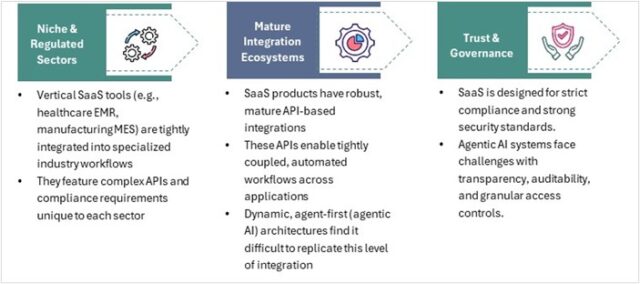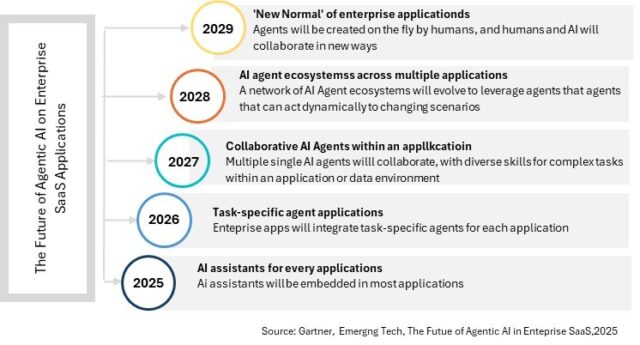The SaaS (Software as a Service) model has defined enterprise software for decades, bringing speed, flexibility, and scalability to every business function imaginable. Now, with the rise of Agentic AI—autonomous AI systems capable of acting, learning, and orchestrating complex workflows—is sparking fresh debate: Is SaaS facing extinction, or entering a new era of augmented power?
The Case for Coexistence—Not Extinction
History shows technological revolutions rarely erase their predecessors. From mainframes surviving the client/server era, to the enduring coexistence of PCs and mobile devices, old and new models find their niche. As Bain & Company and International Brand Equity note, Agentic AI is poised to transform, not eliminate, SaaS—leading to an ecosystem marked by overlap and reinvention.
Why? Levels of disruption vary:

Convergence and Overlap: The Emergent Hybrid

The 2024 SaaS Benchmarks Report shows 56% of SaaS vendors have launched or tested embedded AI features; 41% are monetizing them—up 9% from 2023.
Result: Dashboards give way to conversational UI, zero-friction agent workflows, and the rise of outcome-based automation. But as generative and agentic workflows proliferate, SaaS companies must innovate to remain central in the stack—or risk being bypassed by more flexible, customizable agent-led architectures.
Are We Heading for SaaS Obsolescence?
Complete displacement is unlikely—but significant disruption is inevitable in some domains:
- Outcome-first workflows: In some functions (customer support, sales automation, workflow orchestration), agentic AI already eclipses static SaaS. Businesses may rationalise back-end systems into unified repositories, and AI agents will directly access and act on this data—sometimes removing the need for distinct SaaS applications
- Custom generative SaaS: Low-code/no-code platforms let teams build AI-driven tools that mimic SaaS at lower cost, tailored to each workflow
- Regulatory, complexity, and value moat: Where compliance, reliability, or deep integrations are paramount, SaaS incumbents with rich data, strong ecosystems, and customer trust maintain a durable edge.
What Should SaaS Companies Do?
Adapt, don’t retreat. Thriving in the agentic AI era means:

The Future of Agentic AI in Enterprise SaaS Applications

Investors and founders: Evaluate whether a company owns defensible data, offers compelling agentic workflows, and has the ability to adapt—core signals of resilience and growth.
Conclusion: The Age of Agentic SaaS Is Here
SaaS is not dying—it’s being rebooted. Expect continued coexistence, with agentic AI enhancing, extending, and sometimes replacing classic SaaS workflows. Winners will be those who adapt quickly, blend autonomy with trust, and reimagine software less as a static service—and more as a proactive, collaborative teammate.
At TH Global Capital, our Investment Banking team specializes in guiding SaaS and AI-driven software companies through transformative M&A and capital raises. We help founders and boards position their businesses for maximum value by articulating unique AI capabilities, optimizing tech stacks for acquirer fit, and connecting with leading global investors and buyers. If you’re building or investing in the next wave of agentic SaaS, let’s connect to unlock your opportunity in this rapidly evolving market.
Sources:
- Will Agentic AI Disrupt SaaS? – Bain & Company
- Revolution or Extinction? Rethinking SaaS in the Age of Agentic AI – Blog By LEK